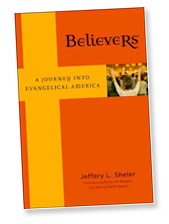Federal authorities receive Valley report
Updated: 12/15/06
Federal authorities receive Valley report
By Ken Camp
Managing Editor
Baptist General Convention of Texas Executive Director Charles Wade has turned over to federal authorities the full report—including supporting evidence—compiled by a team that investigated misappropriated church starting funds in the Rio Grande Valley.
Wade notified members of the BGCT Executive Board by e-mail Dec. 11.
| • See complete list of Valley funds scandal articles |
“We submitted this to the United States Attorney's Office for the Southern District of Texas after we determined federal statutes of limitations and other factors made it the most appropriate starting point for consideration of possible criminal law violations. This does not rule out future efforts with local authorities, but legal counsel informs us it would not be appropriate to pursue both federal and local action at the same time,” he wrote.
In turning over the evidence, Wade noted he also included a letter pledging the BGCT’s willingness to “cooperate fully in any investigation of this matter.”
Wade declined to elaborate further on the criminal investigation, saying, “I want the board and our convention to be kept abreast of these matters as they develop, but the best way for us to help the authorities do their proper work is to give them time and not interfere in their processes.”
At its Nov. 13 meeting, immediately prior to the BGCT annual meeting in Dallas, the board approved a motion instructing Wade to “evaluate the advisability of referring the findings of the Oct. 31, 2006, report to any appropriate government investigatory agency.”
At the same time, the board directed him to “consider on an expedited basis the feasibility of and the full range of methods for recovery of funds.”
To that end, Wade noted in his letter to the board, he met personally with the three pastors in the Rio Grande Valley named in the report—Otto Arango, Aaron de la Torre and Armando Vera—to “pursue restitution of misappropriated and misused funds.” The investigators reported the three received at least $1.3 million in church-starting funds from the BGCT, but the majority of the churches they supposedly started no longer exist—and some never did.
“These meetings provided the pastors an opportunity to respond to the allegations and to share their side of the story. In each situation, I asked them to return funds they used in ways not consistent with their stated purpose,” Wade wrote. “If this effort is unsuccessful, we will consider further options—including mediation, arbitration and a civil lawsuit—and I will keep you informed.”
In a related development, BGCT Executive Board Chairman Bob Fowler of Houston assigned Robert Cepeda, chairman of the board’s Church Missions and Ministry Committee, to name an ad hoc group of directors to monitor staff implementation of the motions passed at the board’s November meeting.
Former Executive Board Vice Chairman Jim Nelson will chair the group. Members are Anna Marie Edgemon, member of First Baptist Church in Sulphur Springs; John Nguyen, pastor of Vietnamese Baptist Church in Garland; Doug Evans, pastor of First Baptist Church in Laguna Park; Virginia Bowers, member of First Baptist Church in Muleshoe; Cepeda, pastor of First Baptist Church in Los Fresnos; Fred Roach, member of The Heights Baptist Church in Richardson; and Richard Muir, member of First Baptist Church in Sanger.
Progress already is being made on many of the investigators’ recommendations, Fowler noted, but the ad hoc group will continue to monitor how changes are implemented, including creation of an internal audit function and revamping the church-starting guidelines.
“It is important to realize that some of the actions called for in the resolutions of the Nov. 13 board meeting were already in process by that time,” he said. “Dr. Wade assembled staff leaders immediately after the convention and continued to assign responsibilities for fully implementing all of the board's resolutions and the investigation's recommendations. Good progress is already being made, and I expect that all of the recommendations will be fully implemented by the time of the February regular board meeting.”
News of religion, faith, missions, Bible study and Christian ministry among Texas Baptist churches, in the BGCT, the Southern Baptist Convention ( SBC ) and around the world.

